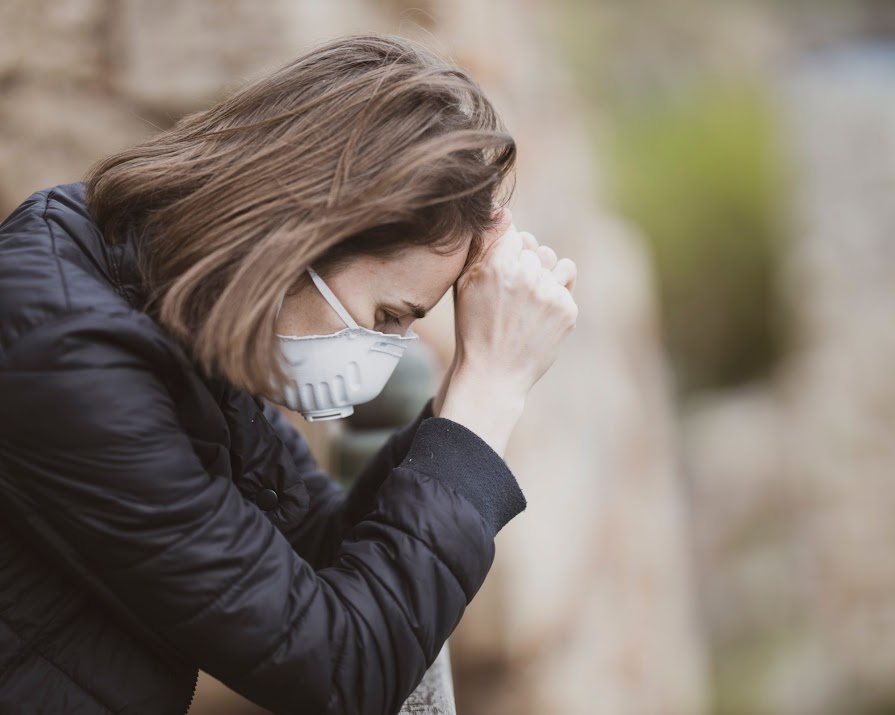
Stress, anxiety, despair: studies reveal Irish people’s post-lockdown fears
By Edaein OConnell
15th May 2020
15th May 2020
New studies carried out have revealed the fear and pressure Irish people are feeling about the aftermath of this pandemic
There is so much unknown about our future.
Before coronavirus, this statement was true to an extent, but we always had a wedding to look forward to or a family gathering to plan. Because Covid-19 has cancelled almost everything, future dates are blank.
This unfamiliar territory can ignite multiple fears.
Two new Irish studies have uncovered the anxieties many of us are feeling, and with Phase One of lockdown restrictions being eased on Monday, these feelings have been heightened.
ERSI
A study carried out by the Economic and Social Research Institute (ERSI) found that most Irish people believe some sort of normality won’t resume until 2021.
Over seven in 10 participants believe normality and life without some form of social distancing will not resume until June 2021 or later. This belief is linked with the availability of a vaccine.
Only 28% of those questioned expect life to go back to normal by the end of 2020.
Over 800 individuals were surveyed. The group was a representative sample of adults from across Ireland.
The ERSI said of the study: “In the continued absence of a treatment or vaccine, the long-term implications of the ongoing need to control infection have apparently sunk in with the public, most of whom anticipate a protracted period in which behaviours will be subject to guidance determined by the prevalence of the virus.”
While Cameron Belton of the ERSI’s Behavioural Unit noted how Irish people have accepted it will be a long process saying, “In the face of this disease, the large majority of people have absorbed the need to proceed slowly and carefully. They are willing to make sacrifices now for a better outcome in the long-run.”
Trinity
According to a survey carried out by Trinity College, three-quarters of workers fear they will contract Covid-19 on public transport.
Five hundred workers in total were surveyed with 32% of that number saying they will walk to work more often, while 25% said they would now use public transport less for travelling to and from work.
As some restrictions are eased this coming Monday, Minister for Transport, Tourism and Sport, Shane Ross said it is likely people will be encouraged to wear face masks on public transport.
United Nations
The United Nation yesterday warned that the Covid-19 pandemic could cause a major worldwide mental health crisis.
With death and job losses occurring daily, the UN said these events are placing a huge strain on the mental well-being of individuals.
UN Secretary-General Antonio Guterres has warned: “After decades of neglect and under-investment in mental health services, the Covid-19 pandemic is now hitting families and communities with additional mental stress. Even when the pandemic is brought under control, grief, anxiety, and depression will continue to affect people and communities.”
Dévora Kestel, head of the World Health Organization’s mental health and substance use department agreed with the UN saying, “We know that the current situations, the fear and uncertainty, the economic turmoil — they all cause or could cause psychological distress.”
She also pointed to national studies that have already shown mental anguish is increasing. In Canada, one survey carried out found that nearly half of the healthcare workers in the region needed psychological support.
Read more: Re-entry anxiety: I don’t know if I want things to go back to normal
Read more: Dr Doireann O’Leary: ‘People are confusing social distancing with self-isolation’
Read more: Moving video series beautifully captures Irish life lockdown, both at home and abroad























